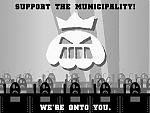Hi Ratzel. I'm drawing many of my observations here from Western European warrior cultures that I am familiar with, both from my own heritage and also from Beowulf (the saga, not that pitiful excuse for a 'movie'). My study of such cultures indicates that warriors tend to gravitate around headmen, thanes or warchiefs, warriors of renown who have earned a prestigious place in society from a mix of combat, boasting, drinking prowess, feats of strength and (sometimes) non-violent competition with other warriors as you describe. A loss of a leader's prestige in front of his warband or group may convince his followers that he is no longer worthy of allegiance and lead them to forsake him. Soldiers don't get to pick and choose their leaders (unless you're Xenophon or in the State Militia c. 1812), and they certainly don't get the right to up and quit whenever they've had enough or things seem to be getting too hard (unless you're in the State Militia c. 1812). While a warrior is committed to a chief or conflict for reasons of personal honour or enrichment, you and others have hit the nail right on the head when you say that soldiers should be about commitment, not only to their organization but also the ideals it embodies and the society that it is intended to protect. Soldiers commit to sacrifice because if they don't no one else will, whereas Warriors do battle for glory and booty because if they don't someone else will.
Warchiefs rule their bands or groups by swordright, so unless he is killed by a usurper, anytime a chief dies, new internal conflict will likely result either in duels to the death or a division into new, smaller bands. One of the benefits of a military hierarchy is that there are clear chains of command and succession should a commander being killed or otherwise incapacitated. While a disciplined fighting force of soldiers can survive the loss of a leader, even a charismatic and rallying one, if you can find out who the warchiefs in a particular society are you stand a greater chance of splintering or neutralizing his fighting force if you can kill, convert or otherwise neutralize him than you would with a force of soldiers.
Furthermore, while warriors do provide their own arms, in exchange for allegiance and adding one's glory to a warchief's, they tend to expect a proportionate reward appropriate to the level of fighting that they undertake. This can take the form of wargear, special distinction or honour bestowed by their chief or a larger share of any booty. While there are rewards such as promotion in a military hierarchy they also come with an increase in responsibility that extends upwards to those who command and downwards to those who follow and have no material benefit except a rise in pay that reflects new responsibility. Special distinctions and commendations are also non-material and usually contribute to advancement and respect within the ranks as opposed to leading to first dibs on booty and having your name added into the saga.
Needless to say, I'd take 1 soldier over 5 warriors any day of the week.








Bookmarks